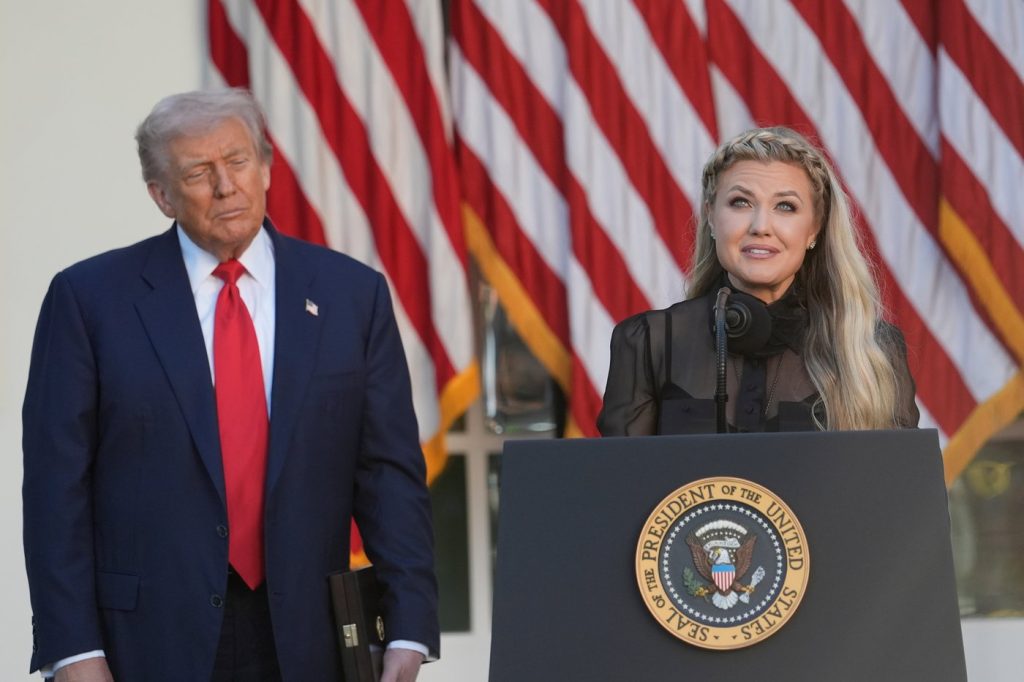WASHINGTON (AP) — President Donald Trump posthumously awarded America’s highest civilian honor, the Presidential Medal of Freedom, to Charlie Kirk, the assassinated conservative activist, on October 14, 2025. The ceremony took place in the Rose Garden of the White House, coinciding with what would have been Kirk’s 32nd birthday and occurring about a month after he was fatally shot while addressing a crowd at Utah Valley University.
Erika Kirk, Charlie's widow, received the medal on his behalf. In an emotional address, she expressed gratitude to the president for honoring her husband in such a significant way, stating, “Your support of our family and the work that Charlie devoted his life to will be something I cherish forever.” Erika's voice cracked with emotion as she spoke about Charlie’s life, political beliefs, and enduring legacy.
During the ceremony, President Trump emphasized Kirk's contributions to the nation, calling him a "great American hero" and a "martyr" for freedom. He praised Kirk as a “fearless warrior for liberty” and noted that he was assassinated in the prime of his life for "boldly speaking the truth" and fighting for a better America. Kirk was the first recipient of the Presidential Medal of Freedom in Trump's second term, highlighting his close ties to the administration and the impact he had on the conservative movement in America.
In September, Trump spoke at Kirk's funeral, reinforcing his admiration for the late activist. Vice President JD Vance accompanied Kirk’s remains back to Arizona, illustrating the high regard in which the administration held him. Trump had just returned to the U.S. from a diplomatic trip to Israel and Egypt, where he played a significant role in brokering a ceasefire agreement in the ongoing conflict with Hamas.
The Presidential Medal of Freedom, originally established by President John F. Kennedy in 1963, recognizes exceptional contributions to national security, world peace, and other significant public endeavors. Trump has previously awarded this honor to notable figures, including sports legends like Tiger Woods and Mariano Rivera, as well as influential conservative voices.
Throughout Tuesday’s ceremony, Trump acknowledged the divisive nature of Kirk’s politics. While Kirk galvanized many young conservatives, his stances on various issues, including LGBTQ+ rights and racial tensions, were often contentious. He frequently echoed Trump’s claims concerning immigration policies attributed to former Vice President Kamala Harris and made controversial statements about George Floyd, whose death sparked national protests against racial injustice.
Amidst the accolades, the Trump administration also took action against individuals deemed to have made offensive remarks about Kirk’s assassination, revoking the visas of six foreigners from Argentina, Brazil, Germany, Mexico, Paraguay, and South Africa. This move reflects the administration's increasing scrutiny of critical commentary regarding Kirk and its efforts to support him posthumously.
As the ceremony unfolded, Trump expressed delight in the large turnout, having moved the event to the Rose Garden for better accommodation. He remarked on the cleared weather, suggesting that divine intervention had favored the occasion. Erika Kirk shared a touching moment involving their daughter, who expressed desires to give her father a birthday present, encapsulating the personal loss intertwined with the public honor.
Concluding her remarks, Erika reinforced her commitment to continuing her husband’s legacy, indicating that although he might have aspired to run for president one day, it would have been out of a genuine desire to serve rather than ambition. She emphasized the importance of freedom, stating that “to live free is the greatest gift but to die free is the greatest victory.”












